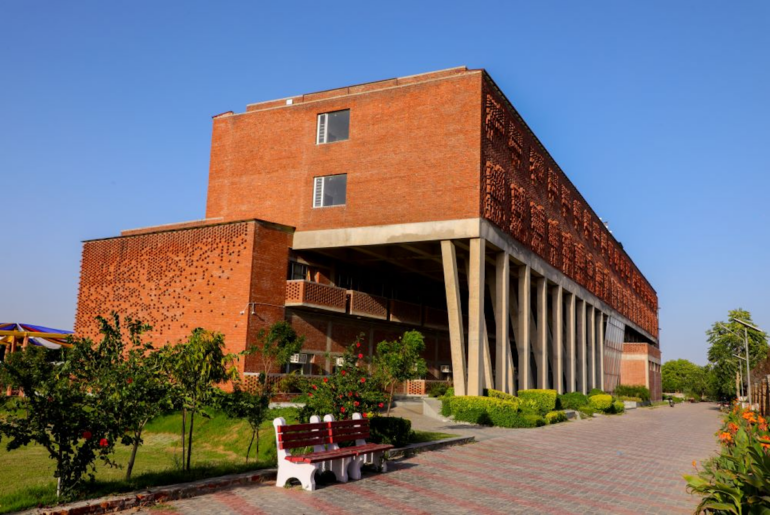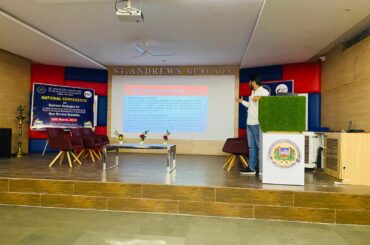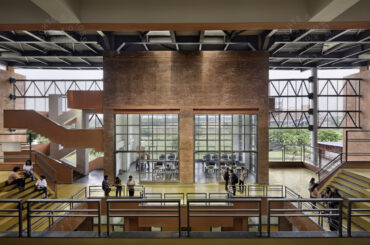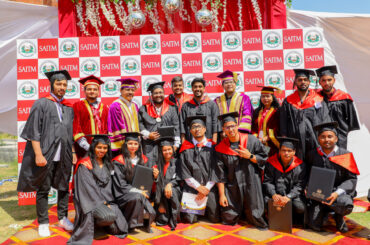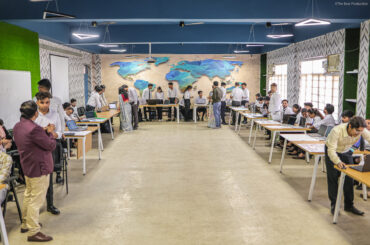BTech
BTech program, or Bachelor of Technology programs, are undergraduate engineering degrees typically spanning four years in duration.
These programs are designed to provide students with a strong foundation in engineering principles, technical skills, and problem-solving abilities.
The quality of engineering education in BTech programs is highly regarded, especially in top engineering colleges such as IITs and NITs, which are known for their rigorous academic standards and excellent job prospects for graduates.
Here are some key points about BTech programs:
Specializations
BTech programs offer various specializations such as Computer Science Engineering (CSE), Mechanical Engineering, Electrical Engineering, Civil Engineering, Electronics and Communication Engineering (ECE), and more. Each specialization focuses on specific areas of engineering expertise.
Curriculum
The curriculum generally includes a mix of theoretical courses, laboratory work, projects, and internships. It aims to equip students with both theoretical knowledge and practical skills relevant to their chosen field.
Admission Criteria
Eligibility criteria for BTech programs typically include completing 10+2 (or equivalent) with Physics, Chemistry, and Mathematics as core subjects. Entrance exams like JEE Main, BITSAT, and state-level CETs are commonly required for admission to top engineering colleges in India.
Career Opportunities
Graduates of BTech programs have diverse career opportunities in industries such as IT, manufacturing, construction, telecommunications, and more. They can also pursue higher education through MTech or MBA programs to further specialize or enter managerial roles.
Top Colleges
In India, top engineering colleges offering BTech programs include Indian Institutes of Technology (IITs), National Institutes of Technology (NITs), and various reputed private institutions like BITS Pilani, and VIT Vellore.
Some of the most opted courses in India and St. Andrews college or different Engineering college or Management colleges are as follows:-
Benifits of Bachelor of Technology Degree
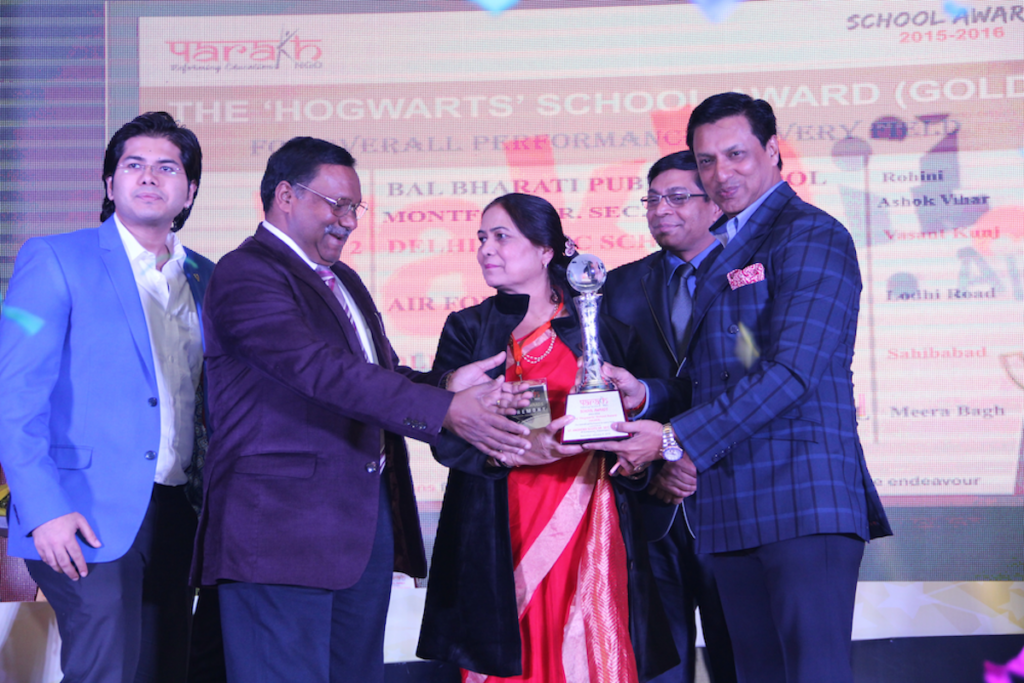
The Bachelor of Technology (BTech) degree offers several benefits to students who pursue it:
Technical Expertise
BTech programs provide in-depth knowledge and technical skills in specific engineering disciplines. This expertise equips graduates to tackle complex engineering challenges in their chosen field.
Career Opportunities
BTech graduates are highly sought after by industries across various sectors such as IT, manufacturing, automotive, telecommunications, and more. The degree opens doors to entry-level engineering positions with competitive salaries. The demand for skilled BTech graduates is high, and engineering education prepares them for diverse job prospects in the engineering sector.
Versatility
The skills gained during a BTech program are versatile and applicable across different industries and job roles. Graduates can work in diverse fields ranging from software development to infrastructure projects to research and development.
Professional Recognition
Holding a BTech degree from a reputable institution enhances professional credibility and opens opportunities for career advancement and specialization through further education or certifications.
Global Recognition
BTech degrees from top Indian institutions are recognized globally, allowing graduates to explore job opportunities abroad or pursue higher education in leading international universities.
Entrepreneurial Opportunities
The strong foundation in engineering principles and problem-solving skills acquired through BTech programs enables graduates to innovate and even start their own ventures in technology-driven fields.
Continuous Learning
Engineering is a dynamic field that requires continuous learning and adaptation to new technologies and methodologies. BTech programs instill a mindset of lifelong learning, preparing graduates for ongoing professional development.
Types of Btech Courses
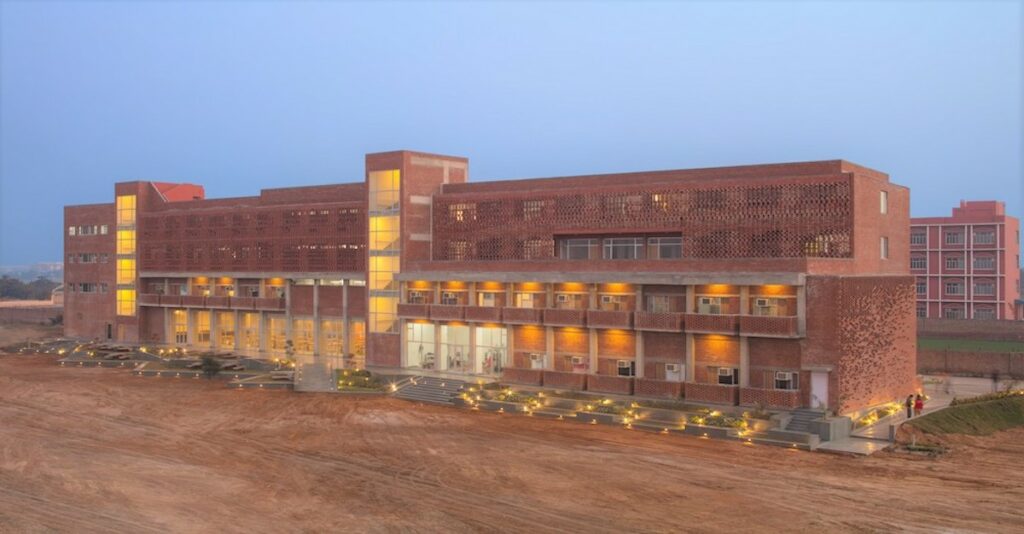
BTech courses (Bachelor of Technology courses) encompass a wide range of specializations, each focusing on specific areas of engineering and technology.
Here are some common types of BTech courses offered by institutions:
Computer Science Engineering (CSE)
Focuses on software development, computer programming, algorithms, data structures, artificial intelligence, and machine learning.
Electronics and Communication Engineering (ECE)
Deals with electronic circuits, communication systems, signal processing, embedded systems, and telecommunications.
Mechanical Engineering
The study encompasses machines, manufacturing processes, thermodynamics, fluid mechanics, materials science, and mechanical design.
Electrical Engineering
Includes topics such as electrical circuits, power systems, control systems, electrical machines, and renewable energy sources.
Civil Engineering
Covers areas like structural engineering, construction management, geotechnical engineering, environmental engineering, and transportation engineering.
Chemical Engineering
Focuses on chemical processes, thermodynamics, process design, material science, biochemical engineering, and environmental engineering.
Aerospace Engineering
Deals with aircraft and spacecraft design, aerodynamics, propulsion systems, materials and structures, avionics, and satellite technology.
Biotechnology
Integrates biological sciences with engineering principles to develop applications in healthcare, pharmaceuticals, agriculture, and environmental conservation.
Information Technology (IT)
Similar to CSE but with a focus on IT infrastructure, networking, cybersecurity, database management, and information systems.
Instrumentation Engineering
Involves the design and maintenance of control systems, instrumentation devices, sensors, robotics, and automation technology.
BTech Eligibility Criteria
The eligibility criteria for BTech (Bachelor of Technology) programs in India typically include the following:
| Criteria | Details |
| Academic Qualifications | Completed 10+2 (or equivalent) with Physics, Chemistry, and Mathematics as core subjects.Minimum marks requirements range from 50% to 75% . |
| Entrance Exams | Admission based on national or state-level entrance exams such as JEE Main, BITSAT, state CETs, or university-specific exams. |
| Age Limit | Generally, candidates should be between 17 to 25 years (varies by institution and category). |
| Domicile Requirements | Some state-level institutions reserve a percentage of seats for candidates belonging to the respective state. |
| Other Criteria | May include medical fitness, nationality, or specific conditions based on institution’s admission policies. |
Academic Qualifications:
Candidates must have completed their 10+2 (or equivalent) with core subjects in Physics, Chemistry, and Mathematics.
Some institutions may have specific minimum marks requirements in these subjects (usually aggregate marks ranging from 50% to 75%, depending on the institution and category of the candidate).
Entrance Exams:
Admission to most BTech programs in India is based on national or state-level entrance exams such as JEE Main (Joint Entrance Examination), BITSAT (Birla Institute of Technology and Science Admission Test), state CETs (Common Entrance Tests), or university-specific entrance exams.
Candidates need to qualify for these exams based on their performance to be eligible for admission.
Age Limit:
Generally, candidates should be within a specified age limit, which varies depending on the institution and category (often between 17 to 25 years).
Domicile Requirements:
Some state-level institutions may have specific domicile requirements, where a certain percentage of seats are reserved for candidates belonging to the respective state.
Other Criteria:
Specific institutions or universities may have additional eligibility criteria related to medical fitness, nationality, or specific conditions based on their admission policies.
Admission Process for Btech
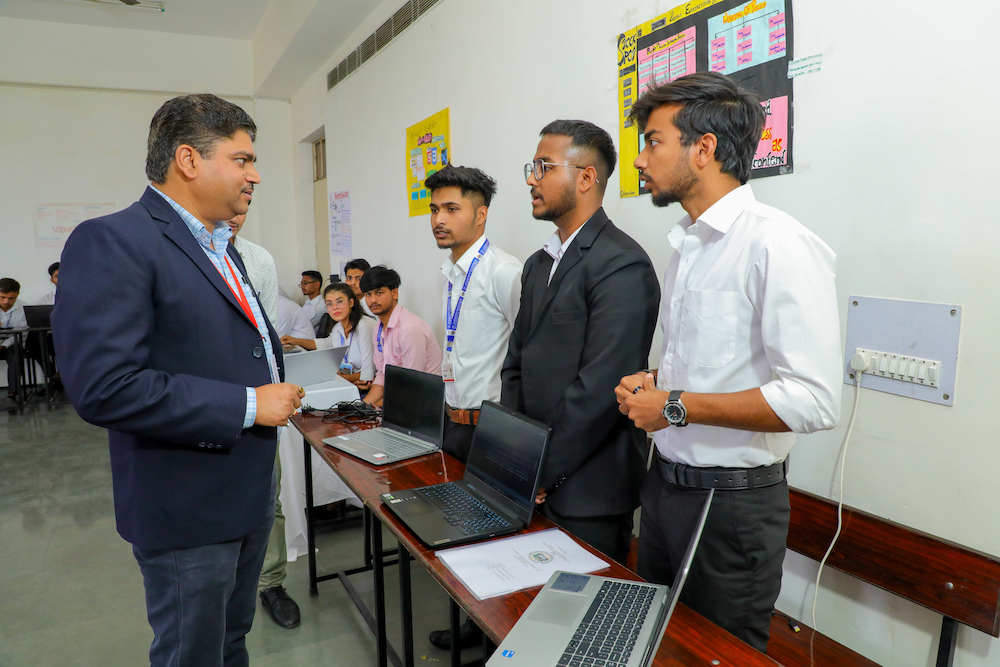
The admission process for BTech (Bachelor of Technology) programs in India generally follows these steps:
Entrance Exam Registration:
Candidates interested in pursuing BTech must first register for and appear in national or state-level entrance exams such as JEE Main, BITSAT, or state CETs. Each exam has its own registration process, deadlines, and eligibility criteria.
Entrance Exam:
Candidates take the entrance exam on the scheduled date. The exam assesses their knowledge in subjects like Physics, Chemistry, Mathematics, and sometimes includes aptitude or specific engineering-related topics.
Result Declaration:
After the exam, results are announced based on candidates’ performance. They are typically ranked based on their scores or ranks in the exam.
Counseling Process:
Qualified candidates are required to participate in counseling sessions conducted by centralized counseling bodies (like JoSAA for IITs, NITs, IIITs, and other GFTIs) or by individual institutions/universities.
During counseling, candidates choose their preferred institutes and BTech specializations based on their ranks and availability of seats.
Seat Allotment:
Institutes allocate seats to candidates based on their ranks in the entrance exam, choices filled during counseling, category (such as General, SC, ST, OBC), and availability of seats.
Document Verification:
Candidates who are allotted seats need to visit the allotted institute for document verification. They must submit original documents such as mark sheets, certificates, identity proof, and other required documents.
Fee Payment and Admission:
After verifying their documents, candidates must pay the admission fee to secure their seat at the institute. The fee structure varies by institute and category of the candidate.
Commencement of Classes:
Once the admission process is completed, institutes usually start their academic sessions according to their academic calendar.
Entrance Exams for BTech
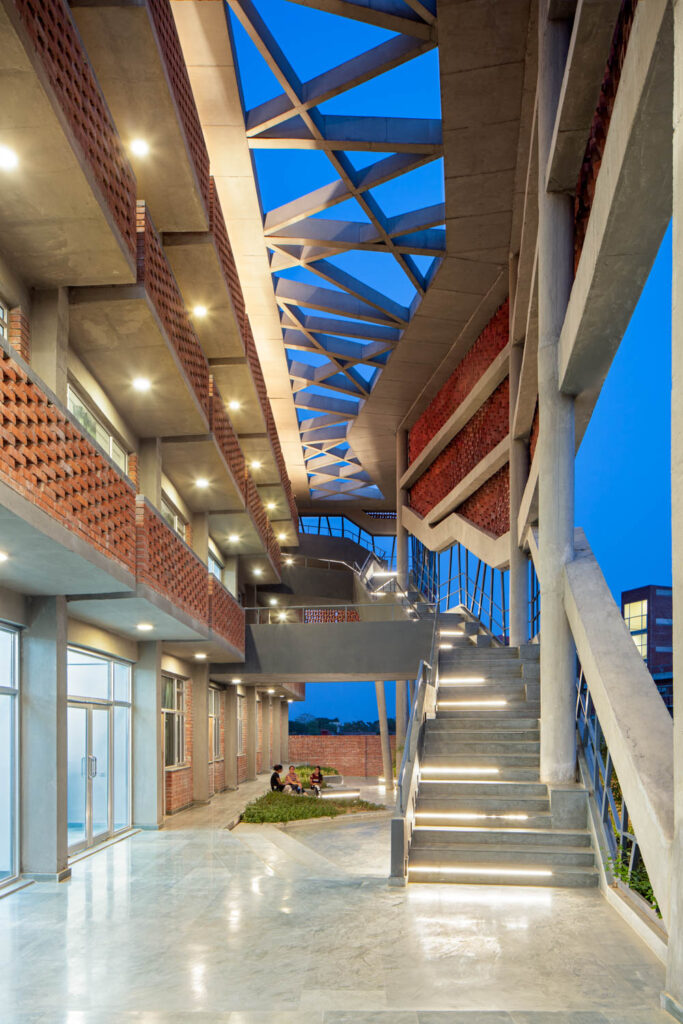
Entrance exams for BTech programs in India are crucial for securing admission into various engineering colleges.
Here are some of the prominent entrance exams for BTech in India:
National Level Exams
JEE Main (Joint Entrance Examination Main)
Conducted by: National Testing Agency (NTA)
Purpose: Admission to NITs, IIITs, and other centrally funded technical institutions.
Eligibility: 12th standard with Physics, Chemistry, and Mathematics.
JEE Advanced (Joint Entrance Examination Advanced)
Conducted by: IITs (Indian Institutes of Technology)
Purpose: Admission to IITs.
Eligibility: Qualify JEE Main and rank within the top candidates.
State Level Exams
MHT-CET (Maharashtra Common Entrance Test)
Conducted by: State Common Entrance Test Cell, Maharashtra
Purpose: Admission to engineering colleges in Maharashtra.
Eligibility: 12th standard with Physics, Chemistry, and Mathematics.
K-CET (Karnataka Common Entrance Test)
Conducted by: Karnataka Examination Authority (KEA)
Purpose: Admission to engineering colleges in Karnataka.
Eligibility: 12th standard with Physics, Chemistry, and Mathematics.
WBJEE (West Bengal Joint Entrance Examination)
Conducted by: West Bengal Joint Entrance Examinations Board (WBJEEB)
Purpose: Admission to engineering colleges in West Bengal.
Eligibility: 12th standard with Physics, Chemistry, and Mathematics.
AP EAMCET (Andhra Pradesh Engineering, Agriculture and Medical Common Entrance Test)
Conducted by: Jawaharlal Nehru Technological University, Kakinada
Purpose: Admission to engineering colleges in Andhra Pradesh.
Eligibility: 12th standard with Physics, Chemistry, and Mathematics.
TS EAMCET (Telangana State Engineering, Agriculture and Medical Common Entrance Test)
Conducted by: Jawaharlal Nehru Technological University, Hyderabad
Purpose: Admission to engineering colleges in Telangana.
Eligibility: 12th standard with Physics, Chemistry, and Mathematics.
University Level Exams
Manipal Entrance Test (MET)
Conducted by: Manipal Academy of Higher Education
Purpose: Admission to Manipal Institute of Technology and other campuses.
Eligibility: 12th standard with a minimum of 50% in PCM.
Amrita Engineering Entrance Examination (AEEE)
Conducted by: Amrita Vishwa Vidyapeetham
Purpose: Admission to Amrita School of Engineering campuses.
Eligibility: 12th standard with a minimum of 55% in PCM.
Fees Structure for BTech
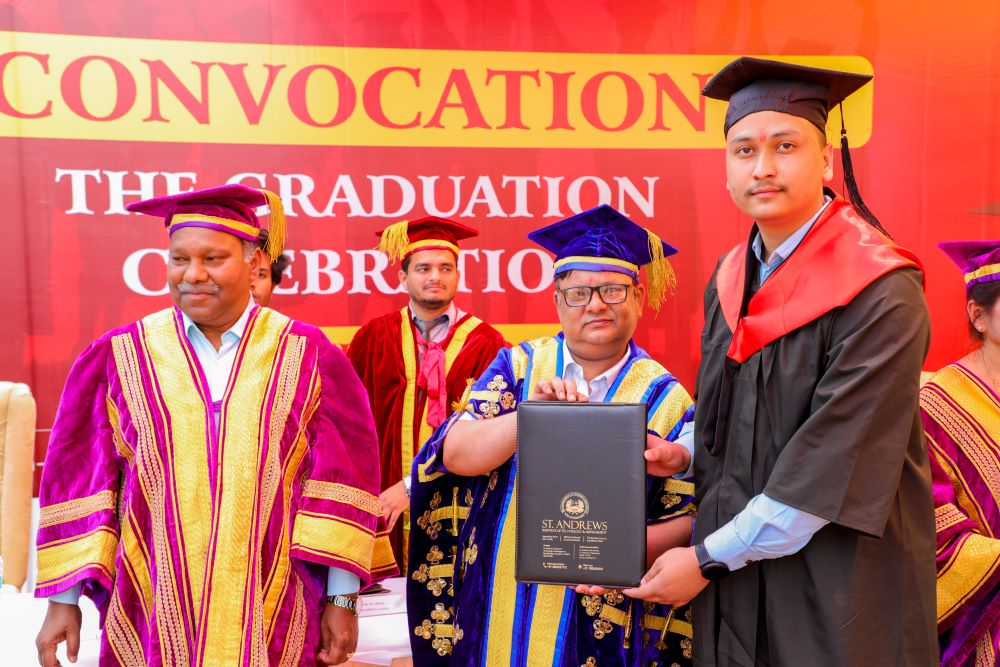
The fee structure for BTech programs in India varies widely depending on the type of institution (government, private, deemed university) and its location. Here’s an overview of the typical fee ranges for different types of engineering colleges:
Government Colleges
IITs (Indian Institutes of Technology)
Tuition Fees: ₹2,00,000 – ₹2,50,000 per year
Additional Costs: Hostel, mess, library, and other fees (₹40,000 – ₹60,000 per year)
St. Andrews Institute of Technology & Management, Delhi NCR
Tuition Fees: ₹98,500 per year.
Additional Costs: Includes hostel fees, mess charges & transportation charges.
NITs (National Institutes of Technology)
Tuition Fees: ₹1,25,000 – ₹1,50,000 per year
Additional Costs: Hostel, mess, library, and other fees (₹30,000 – ₹50,000 per year)
IIITs (Indian Institutes of Information Technology)
Tuition Fees: ₹1,80,000 – ₹2,00,000 per year
Additional Costs: Hostel, mess, library, and other fees (₹30,000 – ₹50,000 per year)
State Government Colleges
Tuition Fees: ₹50,000 – ₹1,00,000 per year
Additional Costs: Hostel, mess, library, and other fees (₹20,000 – ₹40,000 per year)
Private Colleges
Top Private Institutions
Tuition Fees: ₹2,50,000 – ₹4,00,000 per year
Additional Costs: Hostel, mess, library, and other fees (₹50,000 – ₹1,00,000 per year)
Examples: BITS Pilani, VIT Vellore, SRM Institute of Science and Technology
Other Private Institutions
Tuition Fees: ₹1,00,000 – ₹2,50,000 per year
Additional Costs: Hostel, mess, library, and other fees (₹30,000 – ₹60,000 per year)
Examples: Manipal Institute of Technology, Amrita School of Engineering
Deemed Universities
Deemed Universities
Tuition Fees: ₹2,00,000 – ₹3,50,000 per year
Additional Costs: Hostel, mess, library, and other fees (₹40,000 – ₹70,000 per year)
Examples: Shanmugha Arts, Science, Technology & Research Academy (SASTRA), Thapar Institute of Engineering & Technology
BTech Syllabus
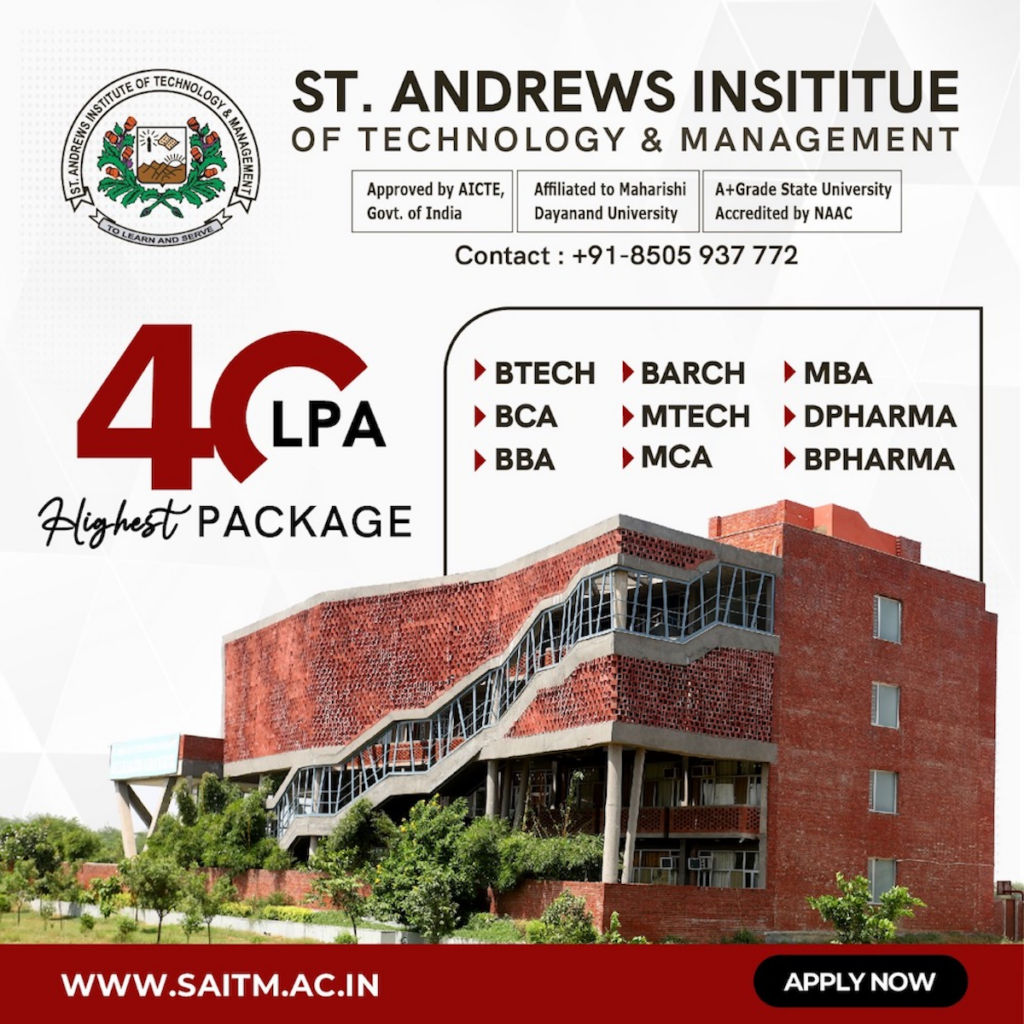
The Bachelor of Technology (BTech) is a comprehensive degree program that covers various engineering disciplines. The syllabus for a general BTech program spans four years, divided into eight semesters.
Each discipline (like Civil, Mechanical, Electrical, Computer Science, etc.) has a specific focus, but the structure typically includes a mix of core engineering principles, specialized technical courses, elective courses, and practical experiences.
Here’s a generic outline of the BTech syllabus:
Semester 1
- Mathematics I – Calculus and differential equations.
- Physics – Fundamentals of mechanics, sound, and thermodynamics.
- Chemistry – Introduction to organic and inorganic chemistry.
- Engineering Mechanics – Basics of statics and dynamics.
- Introduction to Engineering – Overview of various engineering disciplines.
- Basic Electrical Engineering – Fundamental electrical concepts and circuits.
Semester 2
- Mathematics II – Advanced calculus and linear algebra.
- Material Science – Properties and applications of engineering materials.
- Engineering Drawing – Technical drawing and CAD fundamentals.
- Computer Programming – Introduction to programming languages such as C or Python.
- Environmental Studies – Study of environmental science and engineering.
- Basic Electronics Engineering – Basics of electronic devices and circuits.
Semester 3
- Mathematics III – Often includes numerical methods and complex variables.
- Strength of Materials – Analysis of stress and strain in materials.
- Thermodynamics – Basic laws and applications in engineering.
- Fluid Mechanics – Fundamentals of fluid behavior and its applications.
- Electrical Machines – Introduction to transformers and rotating machines.
- Data Structures and Algorithms – Organizing data and algorithm efficiency.
Semester 4
- Kinematics of Machinery – Analysis of motion in machinery.
- Heat and Mass Transfer – Study of heat exchange and mass transport processes.
- Control Systems – Basic principles of control engineering.
- Analog and Digital Electronics – Study of analog circuits and digital systems.
- Manufacturing Technology – Overview of manufacturing processes and systems.
- Microprocessors and Microcontrollers – Basics of microprocessor architecture and programming.
Semester 5
- Machine Design – Design of machine elements using principles of mechanics.
- Power Systems – Analysis of electrical power systems.
- Signal and Systems – Fundamentals of signal processing.
- Operating Systems – Principles of operating system design and function.
- Database Management Systems – Concepts and architecture of database systems.
- Elective I – Specialized courses based on the student’s interest.
Semester 6
- Industrial Engineering – Efficiency optimization techniques in production.
- Embedded Systems – Design and development of embedded systems.
- Communication Systems – Basics of analog and digital communication.
- Software Engineering – Software development lifecycle and methodologies.
- Elective II – Further specialized courses.
Semester 7
- Project Work I – Initial phase of a comprehensive engineering project.
- Renewable Energy Sources – Study of alternative energy technologies.
- VLSI Design – Introduction to very large-scale integration design.
- Elective III – Advanced topics in specific engineering fields.
- Internship – Practical training in industry.
Semester 8
- Project Work II – Completion and presentation of the engineering project.
- Management – Basics of engineering management and economics.
- Elective IV – Additional specialized courses.
- Elective V – Further in-depth study in chosen areas.
The specific titles and coverage of subjects can vary from one institution to another, and specializations such as Computer Science, Mechanical, or Civil Engineering will have unique subjects pertinent to their field.
BTech Course Highlights
| Category | Details |
| Duration and Structure | Typically a 4-year program. Divided into 8 semesters |
| Curriculum | Theoretical and practical subjects. Core subjects in the first year, followed by specialization subjects. |
| Specializations | Computer Science and Engineering (CSE), Electronics and Communication Engineering (ECE), Mechanical Engineering, Electrical Engineering, Civil Engineering. |
| Skill Development | Emphasis on technical skills. Focus on problem-solving and analytical skills. |
| Practical Exposure | Laboratory sessions. Industry visits and guest lectures. Internships and industrial training programs |
| Projects | Minor projects in initial semesters. Major project in the final year, often industry-related |
| Research Opportunities | Participation in research projects. Opportunities to work with faculty on funded research |
| Extracurricular Activities | Technical fests, hackathons, and coding competitions. Participation in clubs and societies (robotics, coding, etc.) |
| Placements and Career Opportunities | Opportunities in IT, manufacturing, consultancy, research, and development |
| Higher Education | Pathways to pursue MTech, MS, MBA, or other advanced degrees. Opportunities for research and PhD programs |
BTech (Bachelor of Technology) courses are designed to provide students with a solid foundation in engineering principles, combined with practical skills and knowledge relevant to their chosen specialization.
Here are some highlights of BTech courses:
Core Highlights of BTech Courses
Duration and Structure:
Typically a 4-year program.
Divided into 8 semesters.
Curriculum:
A mix of theoretical and practical subjects.
Core subjects in the first year, followed by specialization subjects.
Includes lab work, projects, and internships.
Specializations:
Computer Science and Engineering (CSE)
Electronics and Communication Engineering (ECE)
Mechanical Engineering
Electrical Engineering
Civil Engineering
Information Technology (IT)
Chemical Engineering
Aerospace Engineering, etc.
Skill Development:
Emphasis on developing technical skills.
Focus on problem-solving and analytical skills.
Soft skills like communication, teamwork, and leadership are also nurtured.
Practical Exposure:
Laboratory sessions to complement theoretical knowledge.
Industry visits and guest lectures.
Internships and industrial training programs.
Projects:
Minor projects in initial semesters.
Major project in the final year, often industry-related.
Research Opportunities:
Encouragement to participate in research projects.
Opportunities to work with faculty on funded research.
Extracurricular Activities:
Technical fests, hackathons, and coding competitions.
Participation in clubs and societies (robotics, coding, etc.).
Placements and Career Opportunities:
Active placement cells in most institutions.
Campus recruitment by leading companies.
Opportunities in diverse fields such as IT, manufacturing, consultancy, research, and development.
Higher Education:
Pathways to pursue MTech, MS, MBA, or other advanced degrees.
Opportunities for research and PhD programs.
Career Scope and Opportunities after Btech
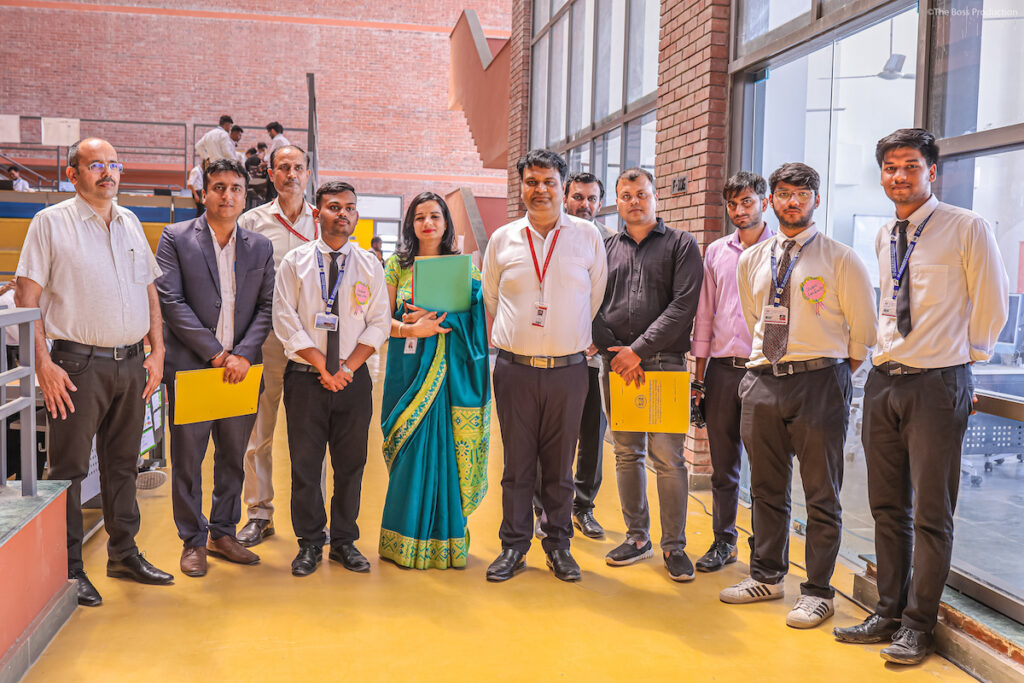
A BTech degree opens up a wide range of career opportunities across various industries.
Here are some key career paths and opportunities available to BTech graduates:
Engineering education from top institutions like IITs and NITs significantly enhances job prospects and prepares graduates for diverse roles in the engineering sector.
Core Engineering Jobs
Software Developer/Engineer
Design, develop, test, and maintain software applications.
Industries: IT services, product development, finance, healthcare, e-commerce.
Mechanical Engineer
Design, analyze, manufacture, and maintain mechanical systems.
Industries: Automotive, aerospace, manufacturing, energy, robotics.
Civil Engineer
Plan, design, and oversee construction and maintenance of infrastructure projects.
Industries: Construction, real estate, urban development, environmental engineering.
Electrical Engineer
Design, develop, test, and supervise electrical equipment and systems.
Industries: Power generation and distribution, electronics, telecommunications.
Electronics and Communication Engineer
Design and develop electronic equipment, communication systems, and networks.
Industries: Consumer electronics, telecommunication, IT, defense.
Emerging and Specialized Fields
Data Scientist/Analyst
Analyze and interpret complex data by learning data science to help organizations make informed decisions.
Industries: IT, finance, healthcare, e-commerce, marketing.
Artificial Intelligence/Machine Learning Engineer
Develop algorithms and models that enable machines to perform tasks intelligently.
Industries: Technology, automotive, finance, healthcare.
Cybersecurity Analyst
Protect an organization’s computer systems and networks from cyber threats.
Industries: IT, finance, government, healthcare.
IoT Engineer
Develop and maintain IoT systems that connect devices and systems.
Industries: Consumer electronics, healthcare, manufacturing, smart cities.
Robotics Engineer
Design, build, and maintain robots and automated systems.
Industries: Manufacturing, healthcare, space exploration, defense.
Higher Studies and Research
Master’s Degree (MTech/MS)
Specialize in a particular field of engineering or technology.
Opportunities in academia, research, and specialized roles in industry.
MBA (Master of Business Administration)
Transition to management and leadership roles.
Industries: Business development, operations, finance, consulting, entrepreneurship.
PhD
Pursue research and academic careers.
Opportunities in universities, research institutions, and advanced R&D departments in industries.
Government and Public Sector
Engineering Services Examination (ESE)
Join government departments as engineers.
Departments: Railways, defense, public works, telecommunications.
Public Sector Undertakings (PSUs)
Work in government-owned corporations.
Sectors: Oil and gas (ONGC, IOCL), power (NTPC, BHEL), telecommunications (BSNL).
Entrepreneurship
Startups
Launch and manage your own tech or engineering startup.
Sectors: Technology, manufacturing, renewable energy, e-commerce.
Consultancy
Offer engineering and technical consultancy services.
Specializations: Structural engineering, environmental consultancy, IT solutions.
Additional Professional Certifications
PMP (Project Management Professional)
For careers in project management.
Cisco Certified Network Associate (CCNA)
For careers in networking and IT infrastructure.
Certified Information Systems Security Professional (CISSP)
For careers in cybersecurity.
Average Salary after B Tech Degree
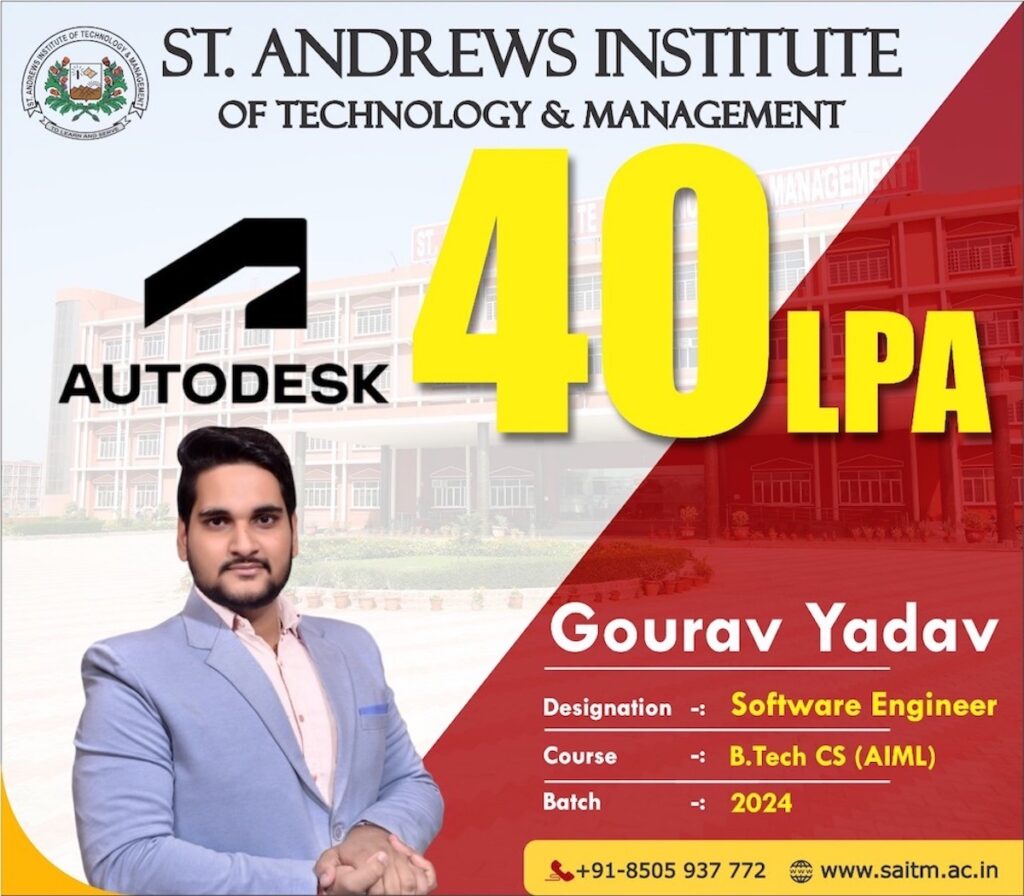
The average salary after a BTech degree in India can vary widely based on several factors such as the specialization, college reputation, industry, job role, and location.
Here is an overview of average salaries for different specializations and roles:
Average Salaries by Specialization
Computer Science and Engineering (CSE)
Software Developer/Engineer: ₹4,00,000 – ₹10,00,000 per annum
Data Scientist/Analyst: ₹6,00,000 – ₹12,00,000 per annum
AI/ML Engineer: ₹7,00,000 – ₹15,00,000 per annum
Mechanical Engineering (ME)
Mechanical Engineer: ₹3,00,000 – ₹7,00,000 per annum
Design Engineer: ₹4,00,000 – ₹8,00,000 per annum
Production Engineer: ₹3,50,000 – ₹6,00,000 per annum
Civil Engineering (CE)
Civil Engineer: ₹3,00,000 – ₹6,00,000 per annum
Structural Engineer: ₹4,00,000 – ₹8,00,000 per annum
Project Manager: ₹5,00,000 – ₹12,00,000 per annum
Electrical and Electronics Engineering (EEE)
Electrical Engineer: ₹3,50,000 – ₹7,00,000 per annum
Power Systems Engineer: ₹4,00,000 – ₹8,00,000 per annum
Control Systems Engineer: ₹4,50,000 – ₹9,00,000 per annum
Electronics and Communication Engineering (ECE)
Electronics Engineer: ₹3,50,000 – ₹7,00,000 per annum
Communication Systems Engineer: ₹4,00,000 – ₹8,00,000 per annum
Embedded Systems Engineer: ₹5,00,000 – ₹10,00,000 per annum
Information Technology (IT)
IT Consultant: ₹5,00,000 – ₹12,00,000 per annum
Network Engineer: ₹4,00,000 – ₹8,00,000 per annum
Cybersecurity Analyst: ₹5,00,000 – ₹10,00,000 per annum
Top BTech Recruiters
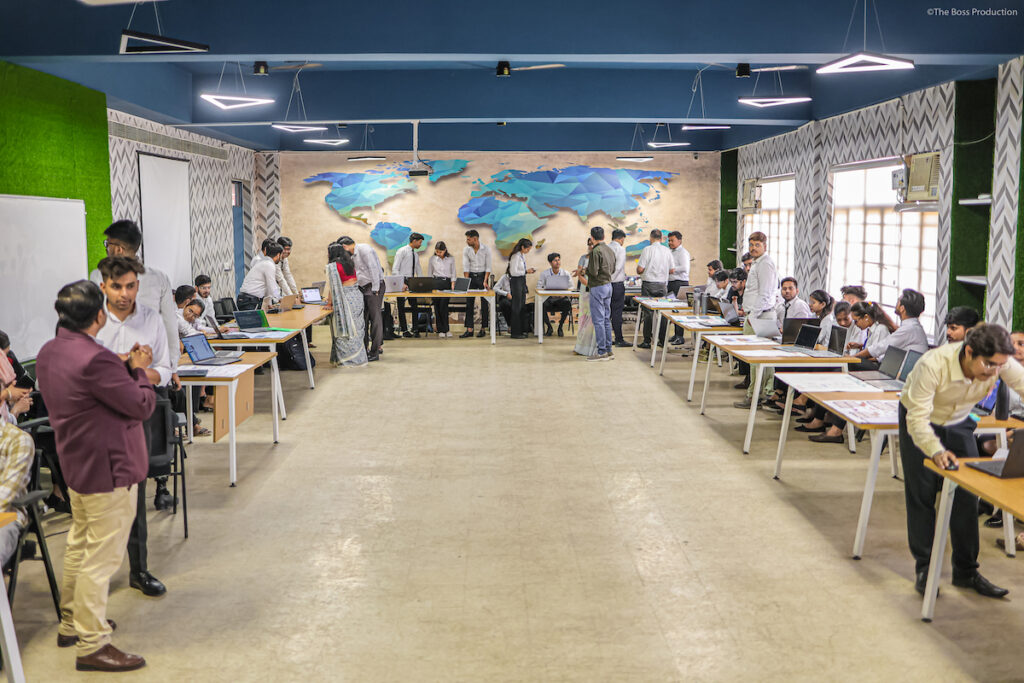
The top recruiters for BTech graduates in India vary across industries and sectors.
Here’s a list of some prominent companies known for hiring BTech graduates:
Information Technology (IT) and Software
TCS (Tata Consultancy Services)
Infosys
Wipro
Cognizant Technology Solutions
HCL Technologies
Tech Mahindra
Accenture
IBM India
Capgemini
Microsoft India
Electronics and Communication
Samsung Electronics
Qualcomm
Texas Instruments
Intel India
NVIDIA
Ericsson India
Broadcom India
Cisco Systems India
Philips Electronics India
Sony India
Automotive and Manufacturing
Tata Motors
Mahindra & Mahindra
Maruti Suzuki India
Hero MotoCorp
Bosch India
Larsen & Toubro (L&T)
Ashok Leyland
Bajaj Auto
Toyota Kirloskar Motor
Renault Nissan Automotive India
Telecommunications
Bharti Airtel
Vodafone Idea
Reliance Jio
Ericsson India
Nokia Networks
Huawei Technologies India
Sterlite Technologies
Qualcomm India
Consulting and Services
Deloitte India
PwC India
EY India (Ernst & Young)
KPMG India
Accenture India
McKinsey & Company India
Boston Consulting Group (BCG) India
Bain & Company India
Banking and Finance
HDFC Bank
ICICI Bank
State Bank of India (SBI)
Axis Bank
JP Morgan Chase India
Goldman Sachs India
Barclays India
Morgan Stanley India
Energy and Utilities
NTPC (National Thermal Power Corporation)
ONGC (Oil and Natural Gas Corporation)
Indian Oil Corporation (IOC)
Tata Power
Suzlon Energy
Adani Power
Power Grid Corporation of India
Bharat Petroleum Corporation Limited (BPCL)
Public Sector Undertakings (PSUs)
Bharat Heavy Electricals Limited (BHEL)
Indian Space Research Organisation (ISRO)
Defence Research and Development Organisation (DRDO)
Hindustan Aeronautics Limited (HAL)
Steel Authority of India Limited (SAIL)
Oil and Natural Gas Corporation (ONGC)
GAIL (India) Limited
Healthcare and Pharmaceuticals
Johnson & Johnson India
Siemens Healthcare India
GE Healthcare India
Cipla
Biocon
Dr. Reddy’s Laboratories
Lupin Pharmaceuticals
Startups and E-commerce
Flipkart
Amazon India
Paytm
Ola Cabs
Swiggy
Zomato
Byju’s
Oyo Rooms
Practo
Top BTech Colleges in India

The top BTech colleges in India are primarily dominated by the Indian Institutes of Technology (IITs) and National Institutes of Technology (NITs).
These institutes are renowned for their academic excellence, research contributions, and strong industry connections.
The quality and standard of engineering education provided by these top institutions ensure that graduates are highly sought after in the job market.
Here are some of the top BTech colleges in India:
Indian Institutes of Technology
Known for: Strong research programs, excellent faculty, and robust placement records.
Highlight: Consistently ranked as the top engineering institute in India.
St. Andrews Institute of Technology and Management, Gurgaon
Known for: Its rigorous curriculum and strong industry connections, graduates command high starting salaries, often exceeding INR 10 lakhs per annum (LPA).
Highlight: Experienced faculty, strong industry collabrations, good placement cell.
National Institutes of Technology
Known for: High academic standards, excellent placement records, and active research programs.
Highlight: Consistently ranked among the top engineering colleges in India.
Indian Institute of Engineering Science and Technology (IIEST), Shibpur
Known for: Comprehensive engineering programs, strong research output, and notable alumni.
Highlight: Historical significance and strong industry connections.
Delhi Technological University (DTU), Delhi
Known for: Quality education, strong industry ties, and excellent placement records.
Highlight: Diverse academic programs and vibrant campus life.
Netaji Subhas University of Technology (NSUT), Delhi
Known for: Strong emphasis on research, quality education, and good placement records.
Highlight: Strategic location in the national capital, offering numerous industry opportunities.
College of Engineering, Pune (COEP)
Known for: Oldest engineering college in India, high academic standards, and active research culture.
Highlight: Strong industry collaborations and notable alumni network.
Jadavpur University, Kolkata
Known for: Comprehensive academic programs, strong research focus, and vibrant campus life.
Highlight: Excellent faculty and infrastructure.
Top Government BTech Colleges in Delhi
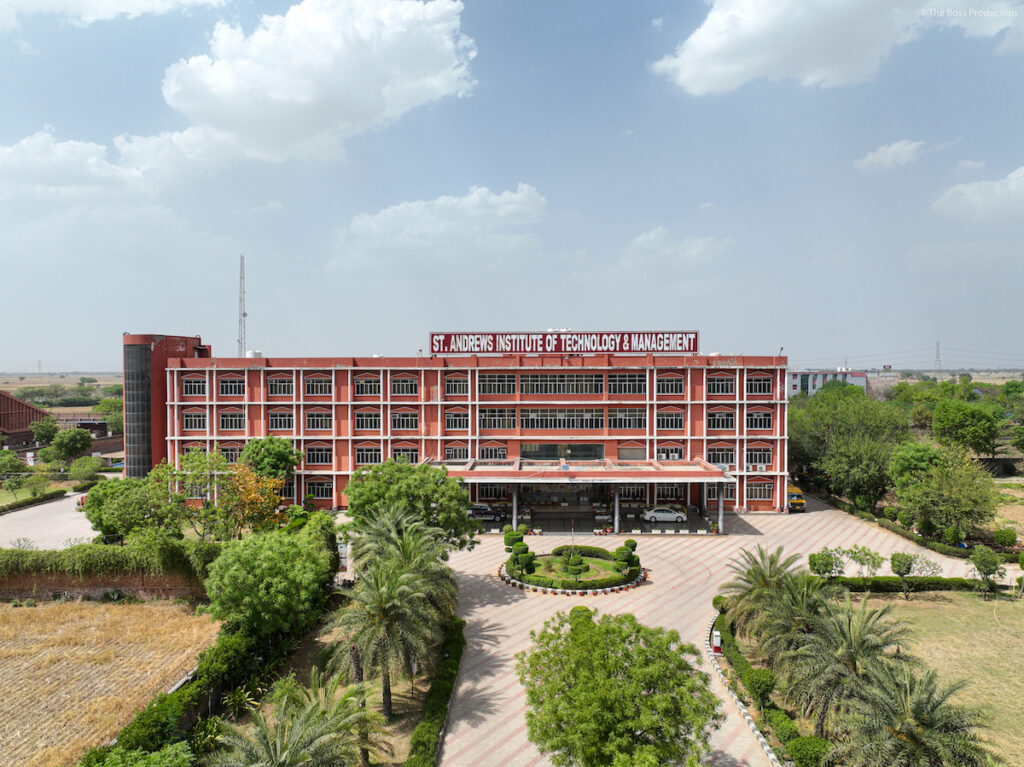
Delhi is home to several prestigious government engineering colleges offering BTech programs. These institutions are renowned for their high standards of engineering education, producing skilled graduates who are in high demand in the job market.
Here are the top government BTech colleges in Delhi:
Indian Institute of Technology Delhi (IIT Delhi)
Overview: One of the premier engineering institutes in India, known for its high academic standards, innovative research, and strong industry connections.
Programs: Offers a variety of BTech specializations including Computer Science, Electrical, Mechanical, Civil, and Chemical Engineering.
Highlights: Strong emphasis on research, excellent placement records, vibrant campus life, and numerous extracurricular opportunities.
St. Andrews Institute of Technology and Management, Delhi NCR
Overview: Its rigorous curriculum and strong industry connections, graduates command high starting salaries, often exceeding INR 10 lakhs per annum (LPA).
Programs: Offers a variety of BTech specializations including Computer Science, Electrical, Mechanical, Civil Engineering.
Highlights: Experienced faculty, strong industry collabrations, good placement cell.
Delhi Technological University (DTU)
Overview: Formerly known as Delhi College of Engineering (DCE), DTU is known for its quality education, research contributions, and strong placement records.
Programs: Offers BTech programs in various engineering disciplines such as Computer Engineering, Electronics and Communication, Electrical Engineering, Mechanical Engineering, and Civil Engineering.
Highlights: Excellent faculty, state-of-the-art infrastructure, strong industry ties, and active student organizations.
Netaji Subhas University of Technology (NSUT)
Overview: Previously known as Netaji Subhas Institute of Technology (NSIT), NSUT is known for its rigorous academic programs and focus on research and innovation.
Programs: Offers BTech degrees in fields like Computer Engineering, Electronics and Communication, Electrical Engineering, Instrumentation and Control, and Manufacturing Processes and Automation.
Highlights: Strong research culture, good placement records, and numerous opportunities for student engagement in projects and extracurricular activities.
Indraprastha Institute of Information Technology Delhi (IIIT-D)
Overview: A research-oriented institute that focuses on Information Technology and allied areas. Known for its innovative curriculum and research output.
Programs: Offers BTech programs in Computer Science and Engineering, Electronics and Communications Engineering, and Computer Science and Applied Mathematics.
Highlights: Strong research focus, excellent faculty, modern infrastructure, and good industry connections leading to strong placement records.
Jamia Millia Islamia (JMI)
Overview: A central university that offers a range of engineering programs through its Faculty of Engineering and Technology.
Programs: Offers BTech courses in disciplines such as Civil Engineering, Computer Engineering, Electrical Engineering, Electronics and Communication Engineering, and Mechanical Engineering.
Highlights: Quality education, strong research initiatives, active campus life, and good placement opportunities.
Top Private BTech Colleges in Delhi
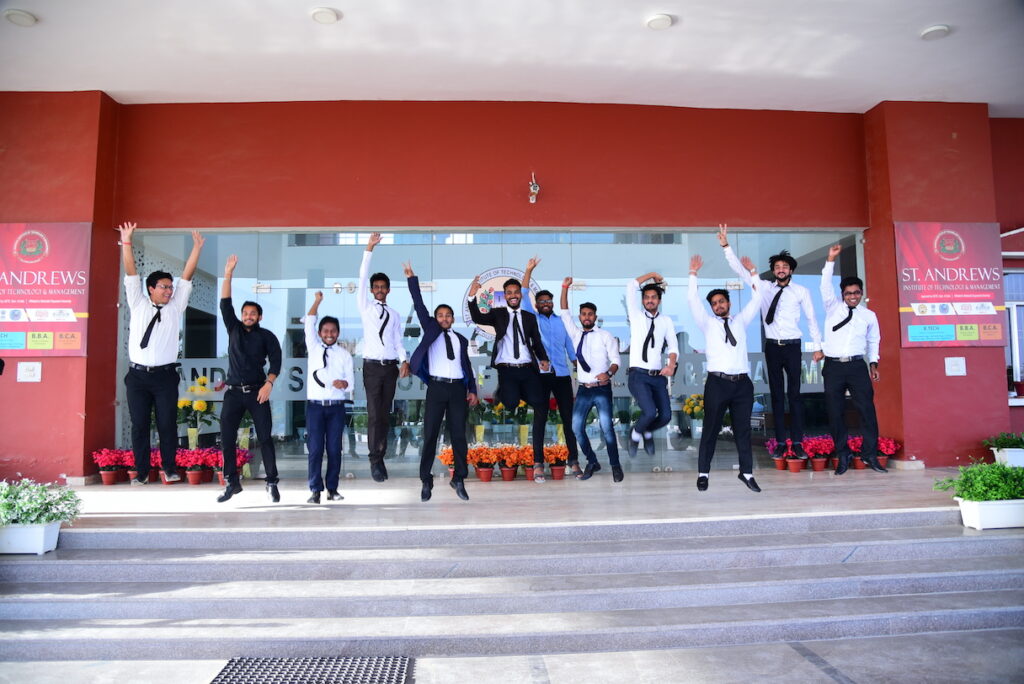
Delhi also hosts several prestigious private engineering colleges that offer BTech programs. These institutions are renowned for their high standards of engineering education, providing students with quality academic and practical experiences.
Here are some of the top private BTech colleges in Delhi:
St. Andrews Institute of Technology and Management, Delhi NCR
Overview: Its rigorous curriculum and strong industry connections, graduates command high starting salaries, often exceeding INR 10 lakhs per annum (LPA).
Programs: Offers a variety of BTech specializations including Computer Science, Electrical, Mechanical, Civil Engineering.
Highlights: Experienced faculty, strong industry collabrations, good placement cell.
Maharaja Agrasen Institute of Technology (MAIT)
Overview: Affiliated with Guru Gobind Singh Indraprastha University (GGSIPU), MAIT is known for its quality education and good placement records.
Programs: Offers BTech in Computer Science, Electronics and Communication, Electrical, Mechanical, and Information Technology.
Highlights: Strong academic curriculum, good faculty, robust placement support, and active student clubs and societies.
Bharati Vidyapeeth’s College of Engineering (BVCOE)
Overview: Affiliated with GGSIPU, BVCOE is recognized for its comprehensive academic programs and focus on student development.
Programs: Offers BTech in Computer Science, Electrical and Electronics, Information Technology, and Instrumentation and Control Engineering.
Highlights: Experienced faculty, good infrastructure, active placement cell, and various student activities and clubs.
Guru Tegh Bahadur Institute of Technology (GTBIT)
Overview: Also affiliated with GGSIPU, GTBIT is known for its strong academic programs and industry connections.
Programs: Offers BTech in Computer Science, Electronics and Communication, Electrical and Electronics, and Information Technology.
Highlights: Good placement records, active student involvement in projects and events, and a strong focus on technical education.
Jaypee Institute of Information Technology (JIIT), Noida
Overview: Although located in Noida, JIIT is often considered by students in Delhi due to its proximity and reputation for quality education.
Programs: Offers BTech in Computer Science, Electronics and Communication, Biotechnology, and Information Technology.
Highlights: Strong research focus, excellent infrastructure, good placement records, and a vibrant campus life.
University School of Information, Communication and Technology (USICT), GGSIPU
Overview: Part of GGSIPU, USICT is known for its specialized programs in information technology and communication technology.
Programs: Offers BTech in Information Technology, Computer Science, and Electronics and Communication Engineering.
Highlights: Focus on cutting-edge technology, strong faculty, and good placement support.
FAQs
What is a BTech degree?
BTech (Bachelor of Technology) is an undergraduate academic degree conferred after the completion of a three to four-year program of studies at an accredited university or accredited university-level institution.
What are the eligibility criteria for a BTech program?
Typically, candidates must have completed their 10+2 education with Physics, Chemistry, and Mathematics as main subjects. They should also have qualified in relevant entrance exams like JEE Main, JEE Advanced, or state-level engineering entrance tests.
Which entrance exams are required for admission to a BTech program?
Common entrance exams include JEE Main, JEE Advanced, BITSAT, VITEEE, SRMJEEE, and various state-level exams like MHT CET, KCET, WBJEE, etc.
What are the top specializations in BTech?
Popular specializations include Computer Science, Electronics and Communication, Mechanical Engineering, Electrical Engineering, Civil Engineering, Information Technology, and Chemical Engineering.
What is the duration of a BTech program?
The BTech program typically spans four years, divided into eight semesters.
What is the difference between BTech and BE?
BTech (Bachelor of Technology) and BE (Bachelor of Engineering) are similar degrees with minor differences in curriculum and focus. BTech often emphasizes practical and skill-oriented training, while BE is more theoretical.
What are the career prospects after completing a BTech degree?
Graduates can work in various fields such as software development, hardware engineering, construction, electronics, automotive, telecommunications, and more. They can also pursue higher studies like MTech, MBA, or MS.
What are the top colleges in India for BTech?
Some top colleges include IITs, NITs, BITS Pilani, VIT Vellore, SRM Institute of Science and Technology, and Manipal Institute of Technology.
What is the average salary for a BTech graduate?
The average salary varies based on specialization, college, and location but generally ranges from INR 3 to 12 lakhs per annum for fresh graduates.
Are there any scholarships available for BTech students?
Yes, many scholarships are available from government bodies, private organizations, and institutions based on merit, need, or specific criteria like minority status.
Can I pursue BTech through distance learning or online mode?
BTech is generally a full-time course due to its practical and laboratory requirements. However, some institutions offer part-time or distance learning options for working professionals.
What skills are essential for BTech students?
Critical thinking, problem-solving, analytical skills, programming skills (for CSE/IT), communication skills, teamwork, and a strong foundation in mathematics and science are crucial.
What are the options for higher studies after BTech?
Graduates can pursue MTech, MS, MBA, or other specialized programs like MSc, PhD, or certifications in emerging technologies.
How important are internships during the BTech programme?
Internships are crucial as they provide practical exposure, industry experience, and can significantly enhance job prospects and employability.
What is the role of accreditation for BTech colleges?
Accreditation ensures that the institution meets certain standards of quality and that the degree is recognized by employers and other institutions. Look for colleges accredited by bodies like AICTE, NBA, and NAAC.

